10 Top Virtual Event Platforms for Seamless Engagements in 2024
Virtual events are a popular and effective way to interact with your audience at every stage of the buyer’s journey. That includes live and automated webinars, on-demand sessions, demos, product intros, panelist discussions, and more.
Many people hesitate to invest in virtual events because they can be difficult to create and launch. But with a thorough plan and the right hosting platform, they can become an integral part of your marketing strategy.
Virtual event platforms offer maximum functionality for all kinds of sessions both virtual and hybrid, including trade shows, conferences, webinars, seminars, workshops, expos, and summits. If you don’t want to host live content, you can record webinars and produce automated content that can expand your brand awareness online. Many platforms offer robust features needed to kick off a serious engagement marketing campaign, but that doesn’t mean the first option you look into will best fit your unique business needs.
To narrow your search, we’ll discuss the benefits of adopting a platform and look at the strengths and weaknesses of a few popular options. By the end, you’ll have the knowledge and confidence needed to decide if you need a virtual event platform and then choose the right one to accommodate your needs, budget, and marketing goals.
.webp)
Knowing Where to Start
When selecting a virtual event platform, look for one that’s user-friendly, with few to no downloads or commitments for your audiences to deal with. It should also be simple for your team to operate as well, whether they’re new to virtual events or seasoned veterans
Below, we’ve broken down 10 top virtual event platforms to provide you a helpful starting point. Compare their top features, pricing, and user testimonials to see if one checks all your boxes.
1. Demio
Demio was the number one virtual event platform in 2023. With it, you can easily set up and refine your online marketing activities. It accommodates webinars (both live and automated), virtual seminars, networking events, and any other type of virtual event.
Top Uses
Demio is the all-around best option for virtual events. It excels at webinars, but any kind of session, as it’s a strong choice for engaging with audiences and product or brand promotion.
If you’re interested in launching on-demand webinars, look no further: Users rave on Capterra and other review sites about Demio’s exceptional performance with this format. It’s ideal for all users, from novices just starting with their brand to experienced marketers seeking an edge in the social media realm.

Key Features
- AI-assisted chat
- Customization and branding
- Email marketing
- Custom domains
- Integration with Google Ads, Drip, and more
- Presentation materials
- Screenshare
- Audience spotlight
- Public & private chat
- No downloads
- 24/7 Support
Pricing Options
Demio offers a free trial and the following price plans, which are billed annually:
- Starter: $42/mo for up to 50 attendees
- Growth: $75/mo for 150 attendees and up
- Premium: $184/mo for 150 attendees and up, plus premium features
Speak to a Demio representative to compare plans.
Customer Reviews
Overall, users report a great experience with Demio and say it’s a stellar solution for marketing teams:
“Best in class for customer support. You can chat to their team via webchat instantly at any time of the day or night, any day of the week! This has been amazingly helpful for us knowing that the team is there to help us overcome obstacles and answer our questions. The support is detailed and connects departments to provide insight and resolve problems. the price is very good as well when compared to alternatives.” — Stephen M.
“Demio is an easy-to-use webinar tool that makes it easy to host panel-style discussions with on-screen presentations. I use the tool for co-branded webinars, and my guests always have an easy time learning the interface. The public chat is intuitive, and I like the poll options and ability to mark audience chats as questions to return to later for live Q&A portions. The audience insights and auto-recording for later distribution are excellent tools, demonstrating the length of participant viewership, focus, and drop-off points.” — Patrick O.
2. BigMarker
BigMarker is another contender among virtual event platforms. It comes with all the bells and whistles, and customers rate its key features highly.
Top Uses
Its ease of use receives passionate praise, but where the platform truly shines is its marketing tools and integrations. Create both virtual and hybrid events with BigMarker, with 15 modules available to make your presentation flawless and fully customized. BigMarker is designed for the event planner, enterprise specialist, and webinar creator.
Users can build automatic reminders, simple invitations, and everything else needed for a successful event and brand promotion. These features appear in crisp interfaces, making training easy, and in-event features like screen sharing are equally straightforward to implement.
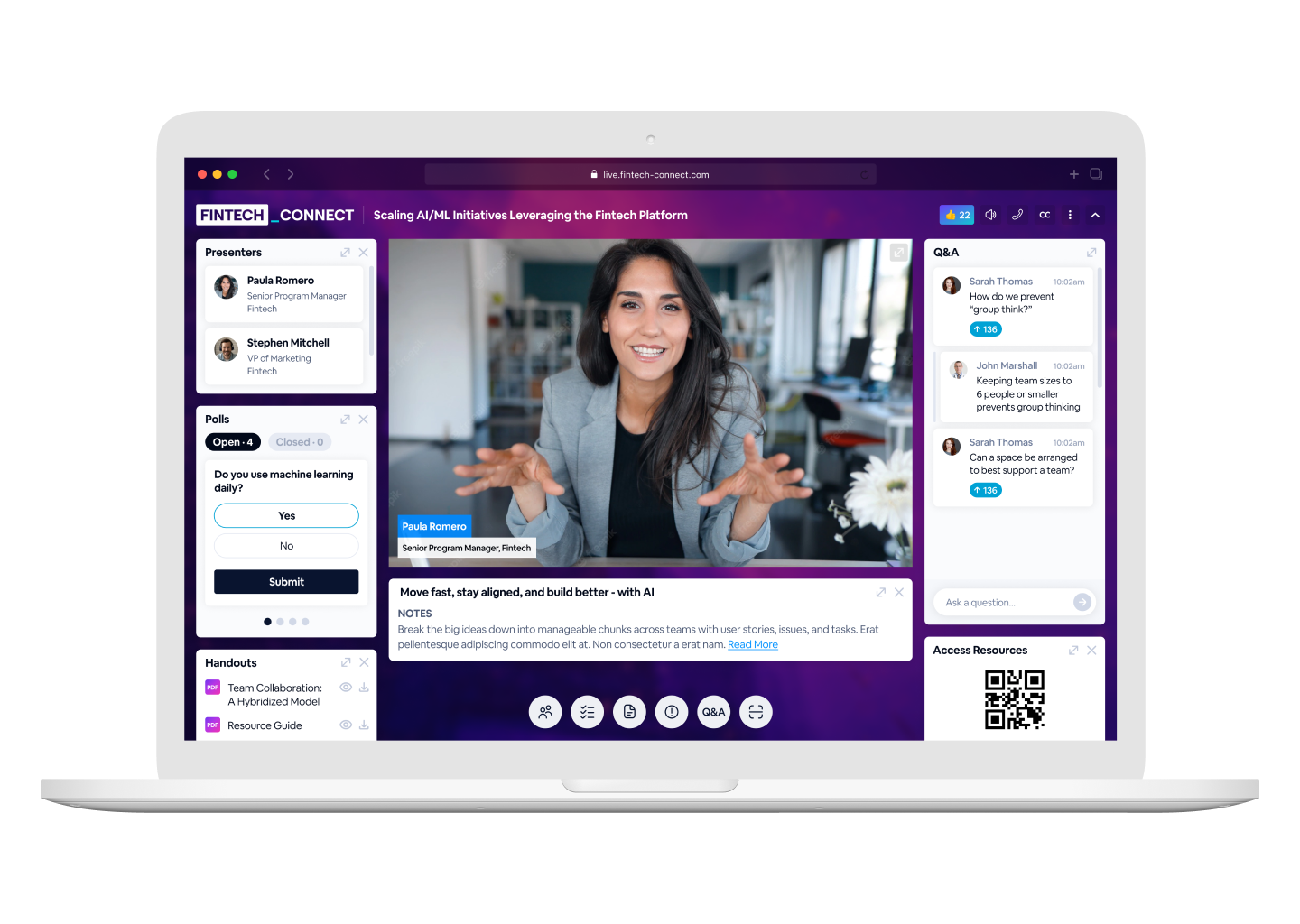
Key Features
- Virtual and on-site registration
- No downloads
- Breakout rooms
- Gamification
- On-demand badge printing and scanning
- Mobile and on-site check-in
- Analytics tracking
Pricing Options
There’s a price plan for every stage of marketing, so speak to a representative to learn more about:
- Webinar plan
- Event packages
- Media hubs
Customer Reviews
BigMarker receives positive reviews from audiences due to its versatility in serving several audiences:
“The features that we like best that BigMarker offers include the instant updates from the admin back-end directly to the app, home screen widgets, background image, “My Favorites” schedule, on-site check-in process with custom question, attendee QR code scanning for networking/leads, AI matchmaking based on industry product categories and region, pre-scheduled push notifications, and post-conference analytics.” - Cassie S.
“If I had to point out an area for improvement, it would be the customizability of their landing pages. We previously built pages with HubSpot and found them more flexible in design. However, this is a minor drawback when considering the list of benefits and features that BigMarker brings. The trade-off has been worth it for us, and I'd recommend them to anyone!” - Leah N.
3. Hubilo
Hubilo is a comprehensive and highly customizable virtual event platform. It boasts features like unique themes and helps facilitate networking with matchmaking abilities, virtual booths, and one-on-one video meetings.
Top Uses
Hubilo stands out for its ability to host and oversee large events with ease and customers rave about its simplicity and virtual waiting rooms. It also offers branding abilities to construct memorable experiences for audiences. Hubilo receives praise for its characteristic networking features as well, which enable additional customizable fields to connect attendees with each other, speakers, and virtual booth members.
The only area where Hubilo falls short is its analytics. However, it’s still more than capable of gathering data to help you improve your event marketing, so, if you need a user-friendly platform for hosting large virtual events, this is the tool for you.

Key Features
- Integrations
- Chat
- Emoji
- User-friendly interface
- No-code landing pages
- Email marketing
- White labeling
Pricing Options
- Webinar+: $8,000 and up
- Webinar Multiply: $12,000 and up
Customer Reviews
Hubilo is consistently lauded for making large conferences easier to execute and manage:
“We used Hubilo for our annual conference of members within our professional organization in lieu of an in-person event. It was our first time doing a virtual conference. It was also a very quick turnaround from when we decided to hold the virtual event until the actual event date (approx. 120 days). We needed not only a platform that was easy to use for our attendees but for those setting it up.” - Mike H.
“Looks professional. Sponsors booths give great exposure. Good communication from their support team. Polls can be ignored by attendees. Limited integrations, no Zapier.” - Harry J.
4. GoTo Webinar
GoTo Webinar is a video conferencing service. It aptly includes “webinar” in the name, as it’s especially well suited for these events. However, it’s equally applicable to other formats, particularly online conferences and meetings.
Top Uses
While it accommodates many digital events, GoTo Webinar was designed for webinars and larger conferences. Within that sphere, it excels at formal sessions like informational webinars and “town hall” formats. Alternatives to GoToWebinar may be less expensive, but they often lack certain important aspects of webinar hosting. If you want to create impactful live and virtual events, this is a platform worth investing in. As a bonus, it’s compatible with mobile devices so you can train and inspire on the go.
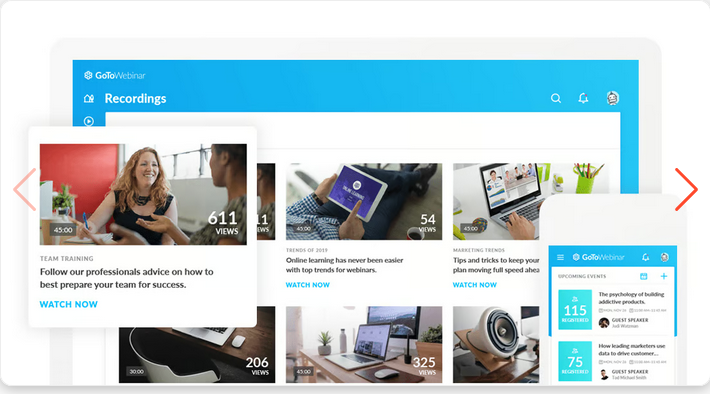
Key Features
- Webcast mode
- Mobile compatible
- Branding capabilities
- Webinar templates
- Event recording
- Engagement dashboard
- Up to six presenters
- 24/7 Assistance
Pricing Options
- Lite: $49/mo
- Standard: $99/mo
- Pro: $199/mo
- Enterprise: $399/mo
Customer Reviews
GoToWebinar makes hosting virtual events a breeze with a variety of engagement features and a user-friendly interface:
“One great item that it seems no other platform offers is the ability to give more than one person (panelist or organizer) keyboard and mouse control so that the transition between speakers is nearly seamless. This seems so basic, but most other platforms don't have this capability — but should! “ - Lisa C.
“I like how they have many features my company looks for. Like muting all attendees and analytics. Sometimes in different regions it can glitch, but rarely.” - Nancy C.
5. Vimeo
Vimeo is a video hosting and sharing platform. Its comprehensive service packages include all kinds of streaming and virtual events.
Top Uses
Vimeo is excellent for live streaming and creating on-demand virtual content. If you want to strengthen your online presence and grow brand awareness, this is a wise solution. Its top use is video creation and editing, but you can also create impressive webinars with Vimeo. Having most of the top features you’d expect, it’s a great B2B option that enables you to better represent your brand at every event.
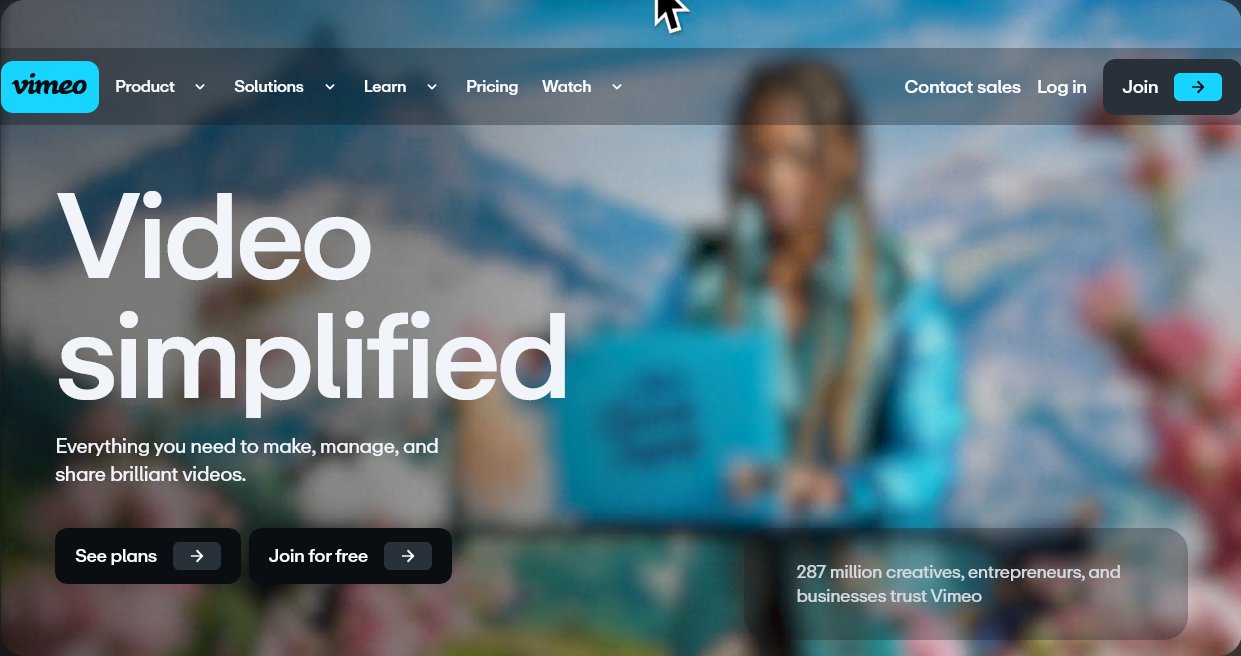
Key Features
- Video creation and editing
- Ad-free video player
- Video library
- Uploads
- Analytics
- Video sharing
- Mobile device compatible
- 24/7 Support
Pricing Options
Vimeo has a free plan to start as well as the following priced options:
- Starter: $12/mo
- Standard: $20/mo
- Advanced: $65/mo
Each plan has different video creation allowances and other features, so speak to a brand representative to see which one will bring your company the most value.
Customer Reviews
As the customer testimonials attest, Vimeo makes it easier to take control of how your videos are created and shown to the world:
“We love the fact that we can have full control over how we can embed our videos. The editable player allows us to hide many distracting elements when embedding a video in a website. It's also really well optimized for embedding background videos without affecting page load.” - Victor A.
“Vimeo's video quality surpasses other platforms, with a minimalistic player and tailored features for both professionals and casual content creators.” - Victor C.
.webp)
6. VFairs
Rating: 4.7/5
VFairs is an events management platform designed to make planning and hosting corporate events a breeze. Users who want a hybrid or entirely virtual experience will find this platform attractive. Businesses hosting in-person events, though, can utilize VFairs capabilities as well.
Top Uses
Large corporate events or organized town hall meetings excel with VFairs, although other hybrid or virtual events also function well with this platform. Most notable is the number of attendees the platform can accommodate: You can host anywhere from 50 to over 10,000 audience members, making this a highly scalable and versatile platform for any business.
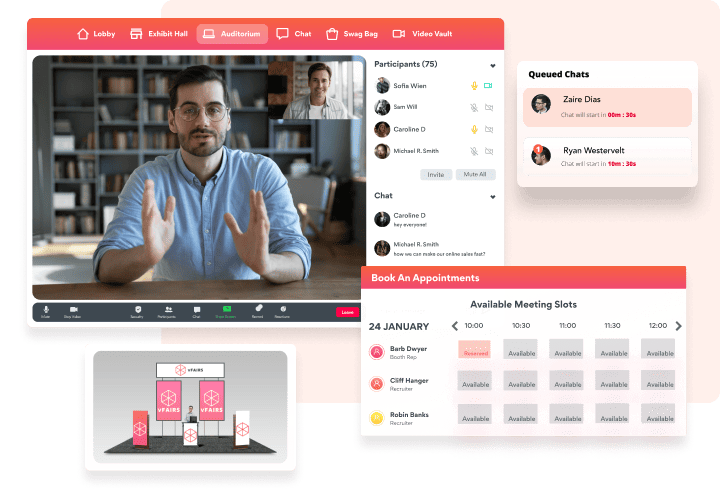
Key Features
- Branded landing pages
- Branded registration forms
- White label mobile app
- Custom badges
- Gamification
- Networking tools
- 3D immersion for virtual attendees
- Seamless integration for hybrid presentations
Pricing Options
Contact a VFairs representative to design a pricing package that suits your business’s needs. Add-ons are available as well.
Customer Reviews
Users appreciate VFairs’ superb customer support and custom features, making it a worthy addition to any growing business:
“[The] VFairs platform works great for us for virtual events, as it's easy to use for attendees and exhibitors. Moreover, their customer and project support is to a very high standard, ensuring good organisation and support at any stage of the event management.” - Patrycja L.
“[V]Fairs was absolutely top notch to work with. We decided last minute to create an app for the World Hip Hop Dance Championship where over 5,000 persons were in attendance. The customer support exceeded our expectations. [V]Fairs was able to create the app that was user-friendly and addressed all of our requirements in record time. Usama Khan [from customer support] was amazing to work with.” - Karen S.
7. RingCentral Events
Rating: 4.5/5
Formerly Hopin, RingCentral Events is a self-proclaimed “all-in-one solution” for your business’s virtual, hybrid, or in-person events. Whether you have clients across the globe or simply want to scale your business with an easier, more affordable solution, RingCentral Events has you covered.
Top Uses
RingCentral Events uses AI-powered technology to help you grow your social media presence online with little effort. The platform is also great for creating live events and is readily scalable so you can host small sessions with a few hundred people or larger events with thousands in attendance. Create event pages with ease and customize the user experience to fit your brand’s image and message.
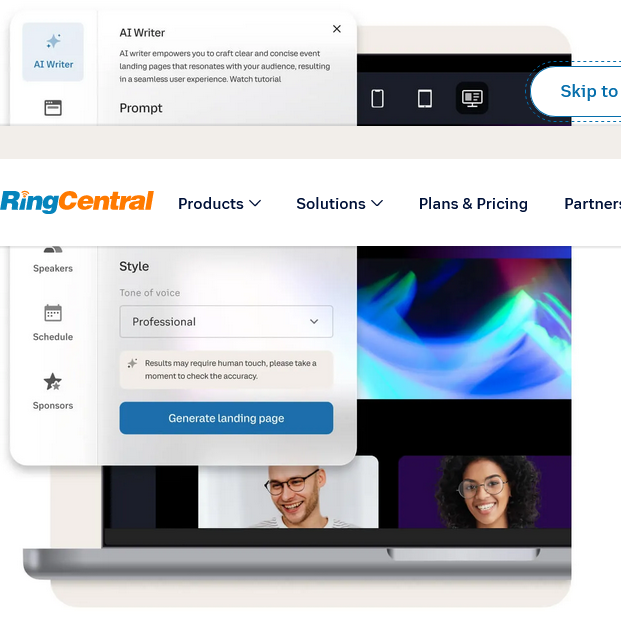
Key Features
- AI Writer
- AI-generated clips
- Customized pages
- Interactive polls, quizzes, and Q&As
- Unlimited networking
- Events datasheet
Pricing Options
This solution provides three price plans: Core, Advanced, and Ultra. Contact a rep to customize your plan.
Customer Reviews
Clients especially enjoy the platform’s versatility and ease of use:
“As a techy person, I found Hopin simple to navigate. It was very easy and user-friendly to upload materials and adjust the format for our event. The customer service was responsive and if I had a question, they supplied the necessary support. Secondly, I consider the fact that downloading of materials is easy to the attendants, without hitches. Although we had to make some adjustments, Hopin perfectly meshed with our event management tool – Attendify.” - Hatem G.
“Robust virtual events platform with feature-rich tools to help make online events easy to manage. Data integration to connect and [analysis of] participants registration has [made] this platform easy to implement.” - Billy C.
8. Welcome
Rating: 4.7/5
Welcome is a webinar and content creation platform that takes the fear out of creating content. If growing your brand and broadening your audience is your goal and you want to let out your inner artist, this user-friendly platform has several tools to guide you.
Top Uses
Welcome is touted as marketing software and is most often employed for its content creation abilities, making it a great solution for crafting fun content. It’s also used to build other virtual events and interact with audiences to help you better connect to the demographic you serve. Users appreciate the ability to analyze the success of webinars and other included content so they can easily improve upon their work as they go. To enhance your business’s online marketing needs, Welcome is a welcomed arrival in the market.
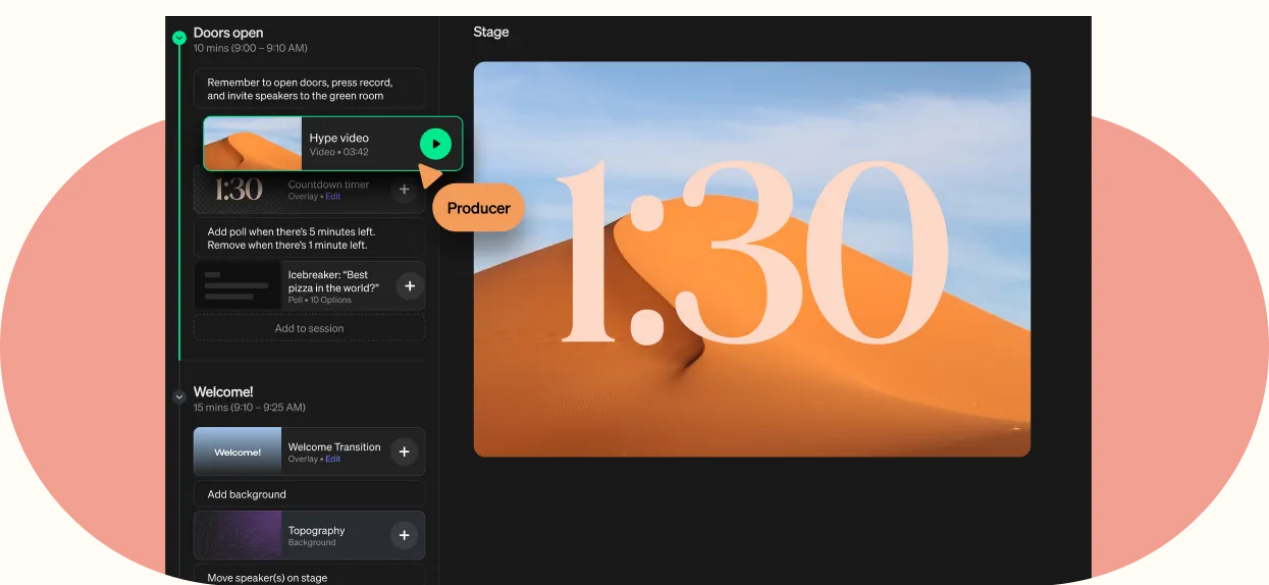
Key Features
- Content creation
- Agenda builder
- Custom registration
- Stage kit
- Green room
- Brand customization
- Reminder emails
- World-class support
Pricing Options
Starting at $500, Welcome features unlimited events. Call the sales team to customize your plan.
Customer Reviews
Welcome is a creative outlet for more modern users, and they vocally appreciate the platform’s features:
“The Welcome team has cracked the code on making webinars FUN AGAIN! Their platform allows for a highly interactive and entertaining experience for our users and attendees alike. The Welcome platform keeps our audience engaged and excited about the webinar. After the webinar is over, we get real time analytics and can easily create evergreen assets from the recording. The overlays, CTAs, and customizable backgrounds really stand out and make our webinars a unique experience.” - Brad S.
“The team at Welcome has built an amazing platform that makes both planning and attending a webinar fun. The back end is like a true production studio, and the pricing plans are meant to scale with our needs. The customer support is amazing to work with, the implementation was smooth, and producers and presenters find it easy to use. We have prospects asking us what we are using because they are so interested in it. They have a fan, for sure.” - Matt L.
9. ON24
Rating: 4.5/5
ON24 is a virtual event platform designed to help businesses generate growth and track the success of their marketing efforts. With a streamlined approach to online marketing, ON24 continues to be a trusted platform for small and large businesses alike.
Top Uses
ON24 focuses heavily on brand differentiation and growth and leverages virtual marketing to accomplish this feat. Businesses who want a no-nonsense approach to quality content creation that they can improve upon appreciate this platform. It’s most commonly used for webinars and other virtual events, as well as audience and analytics tracking.
Host virtual conferences and other events with ease and take advantage of AI to generate compelling content more easily.

Key Features
- Personalized landing pages
- AI-generated content
- Conversion tools
- Audience engagement
- Analytics
- Media player
- Customization and branding
Pricing Options
Contact ON24 for pricing options.
Customer Reviews
ON24 provides a streamlined solution for any business focused on growing their brand and expanding brand awareness:
“On24 has an extremely easy to use interface, and I have been able to train people to set up webinars in less than 30 minutes. It is very intuitive, and support is always available if you have any problems. Any time I have run into an issue or was confused by something, a simple email, phone call, or support chat session solved my problem. Their emergency support is top-notch, with a person answering my call within seconds and being empowered to help me any way that they could. With over 150 webinars completed so far, I have not had any major hiccups or issues.” - Miles S.
“I love the ON24 platform. It's unique, I love how easy it is to use, and the options to customize your webinars are fantastic! The account management team is amazing and always willing to hop on a call to help strategize to make our webinars successful. It was also really easy to learn and set up. I also like that you can see how much your audience engaged with the presentation, including everything they downloaded, clicked on, and interacted with. Super useful!” - Sarah B.
10. 6Connex
Rating: 4.5/5
6Connex is most known for its ability to construct a technologically enriched experience for all businesses through in-person, virtual, and hybrid events. It stands out from other competitors thanks to features like event management apps and more.
Top Uses
6Connex is excellent for building events of all types. This scalable platform allows you to run events with several attendees, making hosting more intimate gatherings or larger conferences a breeze.
Since the platform is fully customizable, you can integrate your brand’s message and logo into every event seamlessly for a uniform marketing strategy. If you enjoy using several apps and technologies to host events, 6Connex is a wise choice, as it integrates well with a large number of solutions.
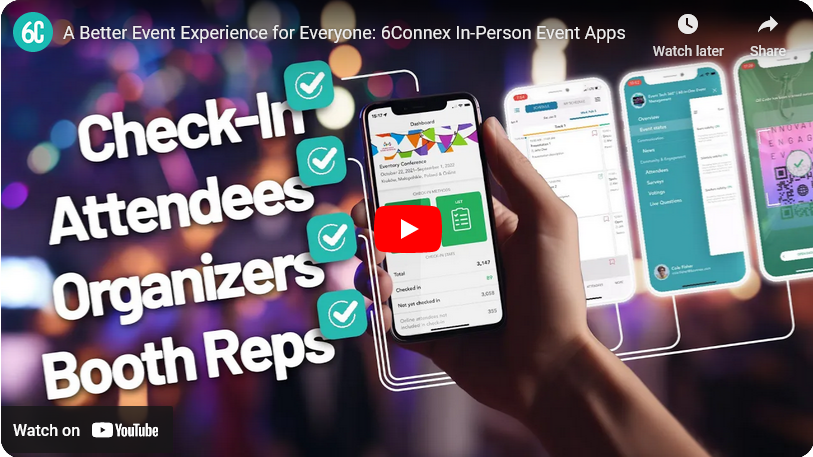
Key Features
- Built-in ticketing and registration
- QR code technology
- Event data
- Networking and games
- 3D immersive space
- Mobile event apps
Pricing Options
Contact 6Connex for pricing.
Customer Reviews
Users of the platform boast about the versatility of 6Connex and how it can help them customize their events:
“I enjoy the ability to customize the platform to fit the needs of any company or event. Everything is adaptable to echo the branding needs, and the design team goes above and beyond to make sure that the event looks great for all.
Customer service is wonderful! Pieter Miering has helped me and my team every step of the way to make sure that we had everything ready for our events this season, and I knew I could count on him to help us succeed.
We had zero glitches or issues during the live event as we have had with other platforms in the past. This was a big relief!” - Meagan O.
“I personally like the personalization of 6Connex the best. With the ability to not only host a virtual event such as a live stream, but also have the capability of including company branding as well as other key features such as attendee registration, attendance, and key results from the chat feature.” - Justin G.
What Are the Key Features of a Virtual Event Platform?
A virtual event platform’s major characteristics should focus on audience engagement, branding, marketing research, and technical support. These are the cornerstones of running adaptable, well-oiled events.
Quality Live-Streaming
High-quality live streaming provides crisp, clear video for your audience and ensures zero interruptions during your event.
A strong virtual event platform should allow both speakers and audience members to participate while being seen and understood clearly, with little to no interference. Since 59% of webinar attendees view live sessions, it pays to use a virtual platform with robust audio and visual capabilities!
This same technical infrastructure offers seamless video chat and fulfills other video needs. A positive attendee experience starts with reliable video quality.
Customizable Interfaces
Customizable interfaces significantly influence event experiences. This is why a platform must have features for designing a unique and user-friendly interface that represents your brand. Demio, for instance, provides templates to create content or insert your brand’s logo and color theme to personalize the interface.
Most virtual event software solutions offer some degree of interface branding, including templates you can tailor so your brand stays at the forefront of attendees’ minds.
.webp)
Interactive Features
This broad category encompasses many engagement tools designed to captivate event attendees. They give audiences enticing opportunities to interact with the event interfaces and feel more involved in the session.
Interactive features vary by engagement type and level of impact. Immersive elements, like the ones Demio offers, include live chat, polls and surveys, Q&A sessions, emojis, and more. Further, the best platforms apply gamification so event planners can craft experiences that are as enjoyable as they are educational and productive.
Analytics and Reports
Like other forms of promotion, event marketing demands data to obtain the best possible results.
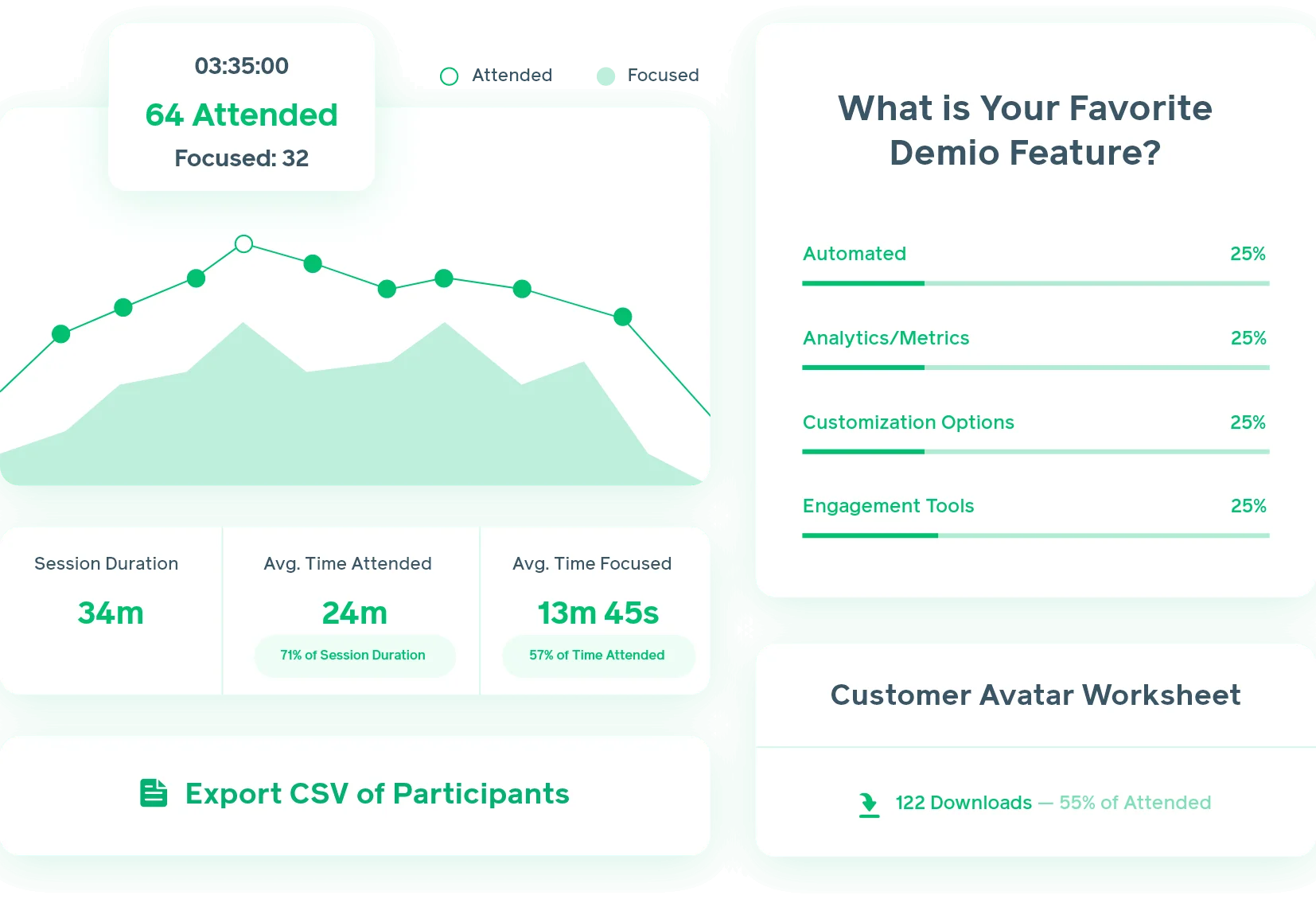
Reliable on-demand webinar platforms and other virtual event solutions come with built-in analytics for a variety of important indicators, which they then present in clean, easily understandable reports. They often include CRM and other integrations as well to facilitate even wider data collection.
Analytics should focus on audience count history (that is, when attendees joined and when they left), attendee engagement and satisfaction, and chat box activity.
Organizers can then leverage this data to optimize their online events. For example, if one part of the presentation sees 10% of the audience leaving the session, you can remove, revise, or replace that segment for future events.
Networking Features
Networking is a star player in event marketing. Various features can promote and facilitate this socialization in your online events, such as:
- One-on-one conversations
- Chat boxes
- Breakout rooms
- Shareable content with contact information
- Social media tools
Support
Event marketing can be technically and mentally challenging. No matter how comprehensive the software is or how thorough your preparations are, management obstacles will arise. In other cases, you may simply need extra support to gain the most from your features.
Check each platform’s technical and customer support reviews and services. A well-designed platform can’t compensate for poor customer assistance; strong support makes issues easier and less stressful to handle.
Look for reviews that mention the support team’s mentality. Also, consider the quality of the ticketing system, how you can contact them, and any other factors you feel are relevant.

Do You Need a Virtual Event Tool?
Virtual event tools are necessary to make your event marketing competitive, but there may be a few rare instances where you don’t necessarily need one. Consider the following questions when deciding whether or not to embrace this type of tool.
Can you hold in-person events?
If in-person events are feasible and have a higher potential return on investment compared to virtual events, you may not need a virtual event tool.
However, in the current post-pandemic world, fewer scenarios exist where physical events are the better option. Moreover, if a business’s target segment is localized, virtual events would be more challenging. This is simply a question of your business model and customer base.
If you can’t hold in-person events, though, due to travel restrictions, financial restraints, or some other roadblock, virtual event tools can salvage the situation and extend your event marketing location.
Do you need better intelligence gathering?
If your goal is to learn as much about your audiences as possible, virtual event platforms are your best bet.
The platforms we’ve covered as well as others come with analytics and reporting out of the box. They remove the need to engage in complex, demanding, in-person surveying or other time-consuming methods. Some input is required, but virtual event platforms largely put these analyses on autopilot.
Event marketing is a long-term process of testing and refining. If you want to hone your efforts while feeding your marketing team fresh, comprehensive, and high-quality data, you need a virtual event tool.
Do you want a larger audience?
Nothing beats a virtual event tool to maximize your audience in the most financially efficient way.
Live events are incredible for many reasons, but the much lower cap on your potential event audience size stands out in particular.
With virtual event platforms, you don’t have the same geographic and logistical restrictions as in-person sessions. Built-in marketing tools and integrations give you a global reach to help you expand your consumer base. For example, email and social media integrations and online marketing efforts open access to a much larger segment.
.webp)
What Are the Benefits of Using a Virtual Event Tool?
More and more companies are embracing virtual event tools and enjoying highly effective event marketing as a result. These solutions bring a number of other attractive benefits, which we’ve broken down below.
Greater Accessibility and Reach
Anyone in the world with an accessible device and Internet connection can attend a virtual event. Most platforms don’t require much from attendees beyond opening a mobile app or web browser; they often don’t even need to download any software.
Convenience is another key advantage of virtual events. Attendees can join from the comfort of their own homes since logistical constraints are largely removed.
Consider features like notifications, registration forms, and check-in processes as well. Top platforms design these elements so registrants can sign up and check in seamlessly.
Cost Savings
Physical events shine in their own way but are expensive and logistically demanding. Although well-planned virtual events can’t match the personal feel of an in-person gathering, the cost-benefit analysis is increasingly favoring online sessions.
Virtual events are significantly less expensive both to host and attend, as registrants don’t need to travel to a physical location. Additional costs that online sessions avoid include:
- Venue rental fees
- Catering costs
- Employee and guest speaker travel expenses
You can create a more personal experience, but that substantially drives up your expenses while alienating many of your customers due to limited accessibility. Choose a platform with a pricing plan that works well for you, such as Demio, which features a free trial and a flexible pricing structure based on your webinar attendance needs.

Flexibility
Virtual event platforms facilitate more flexible scheduling and timing, meaning events can better accommodate attendees. You can choose the best time for your audience or pre-record on-demand content so they can view at their leisure. For example, most webinars are hosted on a Wednesday or Thursday for maximum attendance, so you need a platform that can conform to fluctuating schedules and various time zones.
The lack of logistical, financial, and physical challenges makes event planning much easier and more adaptable for virtual events. Post-event follow-up is also an important component of a strong platform, as you can send digital materials to all attendees no matter where they are in the world and thus expand your reach.
Customer Research
Although you can distribute surveys and collect information from attendees in person, gathering customer data is seamless with on-demand webinar platforms.
Many virtual event platforms have built-in tools to collect and report customer information — and they’re usually customizable. That means you can automatically track engagement, count the number of attendees, establish success metrics, and more with minimal input.
Customer research with these platforms is therefore more accessible and comprehensive. You’re handed everything you need to create memorable virtual experiences and improve them over time. Demio, for instance, provides analytics tools to track the user experience so you can make each online event better than the last.
To supplement their built-in features, platforms normally come with powerful integrations. Email marketing integrations are especially common and help drive home your message and gather valuable information from your follow-up activities.
Get Started With the Right Virtual Event Platform
You’re now ready to take advantage of virtual event platforms and automated webinar software. First, determine your needs and budget, then narrow your options according to these parameters. For best results, we recommend Demio, which was designed by marketers for marketers. If you’re curious about how this platform’s virtual event features can put your event marketing into hyperdrive, book a demo to learn more or get started for free and jump in feet first.
Related Articles
%20(1).webp)
Webinar vs Virtual Event: What's the Difference and How To Choose
%20(1).webp)
Top 12 Automated Webinar Software Tools for Maximizing Conversions
.webp)
.svg)